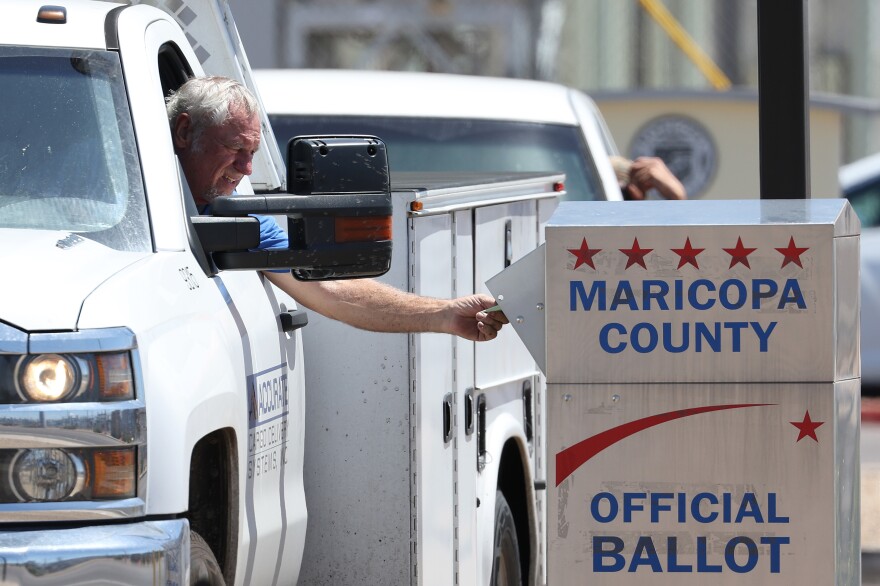By Howard Fischer
Capitol Media Services
PHOENIX -- Two political groups that encourage voting want a federal judge to order members of Clean Elections USA, some armed and in tactical gear, to stay away from ballot drop boxes in Arizona.
A lawsuit filed Monday accuses members of the group and founder Melody Jennings of conducting a "coordinated campaign of vigilante voter intimidation.'' Attorney Daniel Arrellano said that violates not just the federal Voting Rights Act but the 1871 Ku Klux Klan Act which bans private conspiracies to intimidate voters.
And Arellano told U.S. District Court Judge John Tuchi that he needs to act immediately.
"Voting is already underway, and there are only 15 days left until election day,'' he said. Arellano also said that organized vigilante groups already have turned away voters.
He is not alleging that there has been violence.
"But, in the current charged political climate, defendants' actions carry with them exacerbated threats,'' he wrote, with the real risk that the actions will remain peaceful. "Unless enjoined, defendants will continue to bully and intimidate lawful Arizona voters -- including through using armed presences -- who are attempting to do nothing more than vote in accordance with Arizona law.''
Arellano wants Tuchi to do more than prohibit those involved from gathering "within sight of drop boxes.''
He also wants an order barring them from following and taking photos or videos of voters and prospective voters or their vehicles around drop boxes. And Arellano said Tuchi also should bar Jennings and members of Clean Elections USA from "training, organizing, or directing others to do the same.''
In filing suit, he also told Tuchi this isn't just about voter safety.
"In 2020, election workers who were wrongfully accused of misconduct faced unrelenting harassment, including death threats, with some relocating themselves and their families out of fears for their safety,'' Arellano said.
For the moment, the problem -- at least with Clean Elections USA -- appears to be limited to Maricopa County. That's where volunteers who said they were affiliated with that organization set up with cameras outside the county's election offices in downtown Phoenix and a second drop box outside a county office in Mesa.
There already have been multiple complaints forwarded to both the state Attorney General's Office and the FBI about armed people intimidating would-be voters.
Other groups which have announced similar plans elsewhere are not part of this lawsuit.
Arellano said the problem is related to "2000 Mules,'' a film which floated conspiracy theories that "ballot mules'' had stolen the 2020 election by "stuffing'' drop boxes with fraudulent ballots. He said the idea, hatched by Jennings, was to place people around every drop box to deter these "mules.''
"But there are no 'mules' -- they are a paranoid conspiracy - so the people defendant Jennings is targeting are simply voters,'' he told the judge.
He cited a post from Jennings on Truth Social, a social media program founded by former president Trump.
In that, Jennings tells volunteers to follow laws, not to wear MAGA clothing so they don't get accused of electioneers, and abiding by distance guidelines in state law. But she also wants no fewer than eight people at any location.
"Just your presence alone & the mule knowing that they will be caught on ur multiple cameras is enough deterrent to make them shrink back into the darkness,'' Jennings wrote.
And Arellano said that Jennings has effectively admitted her organization's volunteers are the ones involved in what is happening in Arizona.
He pointed out that she posted a photograph of someone using a drop box, saying he "pulled ballots out of his shirt'' and how she needs more people to monitor the site. "Lots of people.''
Arellano also cited an interview with Jennings where she said that some Arizona voters retreated from drop boxes after encountering the groups she had coordinated.
All that, he said, should prove to Tuchi the need for action.
"Defendants' presence is therefore expressly intended to discourage voters from using drop boxes,'' Arellano told the judge.
Much of the basis for his request for a restraining order is based on the 1965 Voting Rights Act which makes it illegal to "intimidate, threaten or coerce'' any person for voting or attempting to vote. And Arellano said that Congress, in crafting the law, specifically said that it need not be shown that the law is violated even if it was the specific purpose of someone to intimidate.
"The (Clean Elections USA) defendants, monitoring drop boxes wearing full tactical gear and bearing arms, are intimidating voters by their presence through a clear threat of physical violence,'' he said.
"Such a presence of armed guards at voting locations with no connection to state government is certainly likely to intimidate voters,'' Arellano said. "Similarly, accusing voters of criminal conduct -- as defendants and their agents have when accusing voters of being 'mules' -- or suggesting that they are otherwise ineligible to vote also can constitute voter intimidation.''
Ditto, he said, of following voters around and recording information about them.
And the Klan Act, Arellano said, bars "conspiracies to interfere with federal elections.'' He also told the judge that law does not require anyone to prove that actors were motivated by racial or other bias.
Multiple efforts to get a response to the lawsuit from either Jennings or anyone from Clean Elections USA were unsuccessful.
-30-
On Twitter: @azcapmedia
Groups want armed Clean Elections USA group banned from ballot intimidation in Arizona

Justin Sullivan
/
Getty Images

